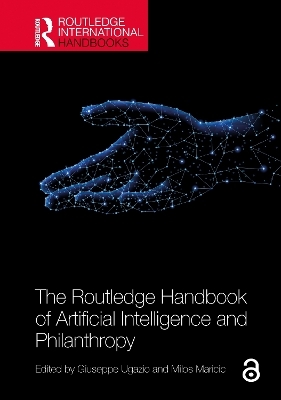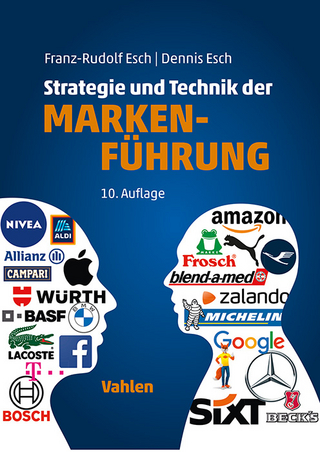
The Routledge Handbook of Artificial Intelligence and Philanthropy
Routledge (Verlag)
978-1-032-74301-1 (ISBN)
The Routledge Handbook of Artificial Intelligence and Philanthropy acts as a catalyst for the dialogue between two ecosystems with much to gain from collaboration: artificial intelligence (AI) and philanthropy. Bringing together leading academics, AI specialists, and philanthropy professionals, it offers a robust academic foundation for studying both how AI can be used and implemented within philanthropy and how philanthropy can guide the future development of AI in a responsible way.
The contributors to this Handbook explore various facets of the AI‑philanthropy dynamic, critically assess hurdles to increased AI adoption and integration in philanthropy, map the application of AI within the philanthropic sector, evaluate how philanthropy can and should promote an AI that is ethical, inclusive, and responsible, and identify the landscape of risk strategies for their limitations and/or potential mitigation. These theoretical perspectives are complemented by several case studies that offer a pragmatic perspective on diverse, successful, and effective AI‑philanthropy synergies.
As a result, this Handbook stands as a valuable academic reference capable of enriching the interactions of AI and philanthropy, uniting the perspectives of scholars and practitioners, thus building bridges between research and implementation, and setting the foundations for future research endeavors on this topic.
The Open Access version of this book, available at http://www.taylorfrancis.com, has been made available under a Creative Commons Attribution-Non Commercial-No Derivatives (CC-BY-NC-ND) 4.0 license.
Giuseppe Ugazio is an Associate Professor in Behavioral Philanthropy and Finance at the Geneva Finance Research Institute, faculty of economics and management of the University of Geneva. He holds two doctorates, one in philosophy and the other in neuro‑economics and studies the neuropsychological mechanisms that influence complex human social behavior. He is pioneering research on the use of AI to unveil the potential of this technology to support the strategies and operations of philanthropy organizations. These projects include the development of a big data‑driven tool using natural language processing to unveil synergies among philanthropic organizations in Switzerland. Milos Maricic is an expert at the intersection of philanthropy, finance, and AI. As the Founder of the Altruist League, a Geneva‑based global philanthropy consultancy, he pioneered the use of AI in investment sourcing, fund distribution, and portfolio management. In 2021, he co‑authored the book Fixing Philanthropy, which proposes a more efficient framework for global giving to address systemic issues. He has represented the venture capital industry in key international discussions on AI regulation. As a former humanitarian executive, he has spoken at major events, advocating for grassroots, citizen‑led organizations.
Acknowledgments. List of Figures. List of Tables. List of appendixes, table of interviews, and boxes. List of Contributors. Foreword: From AI‑empowered philanthropy to philanthropy‑driven AI. Editors’ introduction to the volume. PART I AI applications in the philanthropic sector. 1 The relationship between AI and philanthropy: From historical roots to modern convergence. 2 Measuring meaningful change: AI‑enhanced impact measurement in philanthropy. 3 PHIL4DEV: A text‑based machine learning model to compare philanthropic funding across the world. 4 Fast‑tracking the use of AI in everyday philanthropy. 5 Applying diverse AI tools to transform philanthropic operations: Insights from the for‑profit sector. 6 The use of AI and technology by civil society organizations and its international implications. 7 The impact of artificial intelligence and information technology on philanthropic organizations: Case studies of non‑profit and cultural associations. 8 On the impact of AI‑empowered, gaming‑based virtual worlds on philanthropy. 9 Toward a framework for Responsible AI in storytelling for nonprofit fundraising. PART II Philanthropies’ regional AI adoption, readiness, and applications. 10 Artificial intelligence, machine learning, and data science philanthropy: Case studies of a purposive classification of philanthropic missions. 11 Data science and AI among philanthropic foundations in Europe. 12 Digitalization of Swiss non‑profit foundations: The potential role of AI from a cross‑sectoral perspective. 13 Technological readiness of Asia’s social sector for the adoption and use of artificial intelligence. 14 Digital philanthropy in China: How internet fundraising platforms and artificial intelligence are transforming non‑profit governance. 15 A case study on AI usage for collecting philanthropy data in the Western Balkans. 16 Optimizing philanthropic investment with AI: A case study of the Altruist League. 17 The Spandows: Pioneering AI in family philanthropy and sustainable business. 18 Digital stunt philanthropy: Mechanisms, impact, and ethics of using social media influencing for the greater good. PART III Philanthropy for AI development and regulation. 19 Navigating risk complexity associated with data philanthropy for AI. 20 From margin to mainstream: Moving philanthropy to reshape our AI‑enabled future. 21 Altruistic collective intelligence for the betterment of artificial intelligence. 22 Hand out or help out: A resource‑based view of AI in philanthropy. 23 Philanthropy’s urgent opportunity to create the Interim International AI Institution (IIAII). 24 On foundations and foundation models: What lessons can AI and philanthropy learn from one another? 25 The AI extreme risk mitigation philanthropic sector: A philanthropic ecosystem at the forefront of AI. PART IV Ethics, AI, and philanthropy. 26 How can philanthropy promote ethical, inclusive, and responsible AI development? Lessons from impactIA Foundation. 27 Guided choices: The ethics of using algorithmic systems to shape philanthropic decision‑making. 28 Shaping the ethical and inclusive AI revolution: Five roles for philanthropies. 29 Getting to heaven: What teaching AI teaches us about ourselves. 30 Why philanthropy should embrace the ideological struggle shaping artificial general intelligence: A preliminary theological‑political analysis. 31 AI disruptions in philanthropy: A multi‑scale model of ethical vigilance. 32 AI and philanthropy: How can they elevate each other? Closing reflections and future directions. Index.
| Erscheinungsdatum | 02.11.2024 |
|---|---|
| Reihe/Serie | Routledge International Handbooks |
| Zusatzinfo | 36 Tables, black and white; 77 Line drawings, black and white; 8 Halftones, black and white; 85 Illustrations, black and white |
| Verlagsort | London |
| Sprache | englisch |
| Maße | 174 x 246 mm |
| Gewicht | 1260 g |
| Themenwelt | Wirtschaft ► Betriebswirtschaft / Management ► Marketing / Vertrieb |
| Wirtschaft ► Betriebswirtschaft / Management ► Planung / Organisation | |
| Wirtschaft ► Betriebswirtschaft / Management ► Unternehmensführung / Management | |
| Wirtschaft ► Volkswirtschaftslehre | |
| ISBN-10 | 1-032-74301-8 / 1032743018 |
| ISBN-13 | 978-1-032-74301-1 / 9781032743011 |
| Zustand | Neuware |
| Informationen gemäß Produktsicherheitsverordnung (GPSR) | |
| Haben Sie eine Frage zum Produkt? |
aus dem Bereich


